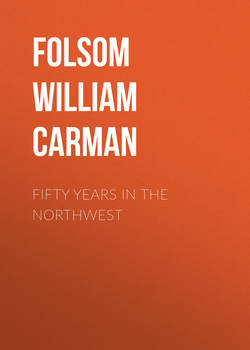Читать книгу Fifty Years In The Northwest - Folsom William Henry Carman - Страница 4
CHAPTER I
DUBUQUE
ОглавлениеDubuque was a town of about three hundred inhabitants, attracted thither by the lead mines. The people were principally of the mining class. The prevailing elements amongst them were Catholic and Orange Irish. These two parties were antagonistic and would quarrel on the streets or wherever brought in contact. Sundays were especially days of strife, and Main street was generally the field of combat. Women even participated. There was no law, there were no police to enforce order. The fight went on, the participants pulling hair, gouging, biting, pummeling with fists or pounding with sticks, till one or the other party was victorious. These combats were also accompanied with volleys of profanity, and unlimited supplies of bad whisky served as fuel to the flame of discord. Dubuque was certainly the worst town in the West, and, in a small way, the worst in the whole country. The entire country west of the Mississippi was without law, the government of Wisconsin Territory not yet being extended to it. Justice, such as it was, was administered by Judge Lynch and the mob.
My first employment was working a hand furnace for smelting lead ore for a man named Kelly, a miner and a miser. He lived alone in a miserable hovel, and on the scantiest fare. In January I contracted to deliver fifty cords of wood at Price's brickyard. I cut the wood from the island in front of the present city of Dubuque, and hired a team to deliver it.
While in Dubuque I received my first letter from home in seven months. What a relief it was, after a period of long suspense, spent in tediously traveling over an almost wilderness country, – amidst unpleasant surroundings, amongst strangers, many of them of the baser sort, drinking, card playing, gambling and quarreling, – what a relief it was to receive a letter from home with assurances of affectionate regard from those I most esteemed.
Truly the lines had not fallen to me in pleasant places, and I was sometimes exposed to perils from the lawless characters by whom I was surrounded. On one occasion a dissolute and desperate miner, named Gilbert, came to Cannon's hotel, which was my boarding house while in Dubuque. He usually came over from the east side of the river once a week for a spree. On this occasion, being very drunk, he was more than usually offensive and commenced abusing Cannon, the landlord, applying to him some contemptuous epithet. I thoughtlessly remarked to Cannon, "You have a new name," upon which Gilbert cocked his pistol and aiming at me was about to fire when Cannon, quick as thought, struck at his arm and so destroyed his aim that the bullet went over my head. The report of the pistol brought others to the room and a general melee ensued in which the bar was demolished, the stove broken and Gilbert unmercifully whipped. Gilbert was afterward shot in a drunken brawl.
I formed some genial acquaintances in Dubuque, amongst them Gen. Booth, Messrs. Brownell, Wilson and others, since well known in the history of the country. Price, the wood contractor, never paid me for my work. I invested what money I had left for lots in Madison, all of which I lost, and had, in addition, to pay a note I had given on the lots.
On February 11th I went to Cassville, journeying thither on the ice. This village had flourished greatly, in the expectation of becoming the territorial and state capital, expectations doomed, as we have seen, to disappointment. It is romantically situated amidst picturesque bluffs, some of which tower aloft like the walls and turrets of an ancient castle, a characteristic that attaches to much of the bluff scenery along this point.
